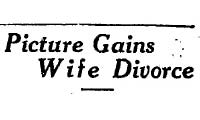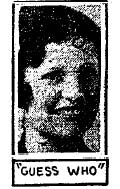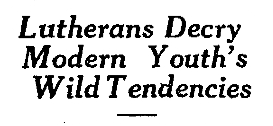
August 20, 1927
Los Angeles
Esther and Wilber Ebermayer weren’t playing a silly children’s game when Esther called out “Guess Who” – she was reading the inscription from the back of a small photograph she had found tucked inside of her husband’s watch case. 
Esther had expected to find her own picture in the case so she was surprised, hurt, and angry when she discovered the coyly inscribed photo of an unknown woman smiling back at her.
Friends to whom Wilber had shown the photo informed Esther that he had been describing the woman as his future bride – once he’d managed to rid himself of his current ball and chain.
The wronged wife immediately sought a divorce from her faithless husband. “Well,” she told Judge Sproul, “if that’s the way he feels about it, he is rid of me right now as far as I’m concerned”.
Memo to Wilber: buy yourself a wristwatch.


 Mrs. Geraldine Haster was a product of her time—too bad her time was so terribly and sinfully debased! It was bad enough that she had taken to wearing cosmetics (!) but then she had even gone so far as to bob her hair (!!)! Why not just tattoo "SCAPEGRACE" across your forehead, Geraldine?
Mrs. Geraldine Haster was a product of her time—too bad her time was so terribly and sinfully debased! It was bad enough that she had taken to wearing cosmetics (!) but then she had even gone so far as to bob her hair (!!)! Why not just tattoo "SCAPEGRACE" across your forehead, Geraldine? Yes, the twenties were a time of tumult and turmoil as conventions unraveled, exposing lots of hypocrisy and kicked-up heels. Lutherans took especial offence at all this gayety, closing their thirty-fifth annual convention today with the adoption of a resolution deploring the tendency of American youth toward “extravagance, immodesty, and disrespect.”
Yes, the twenties were a time of tumult and turmoil as conventions unraveled, exposing lots of hypocrisy and kicked-up heels. Lutherans took especial offence at all this gayety, closing their thirty-fifth annual convention today with the adoption of a resolution deploring the tendency of American youth toward “extravagance, immodesty, and disrespect.”



